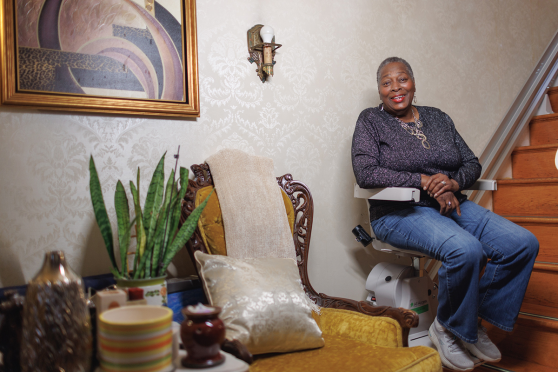Caring for someone with dementia: 3 essential steps
Support and other valuable resources can make life a little easier for all involved

Caregiving requires time, dedication, and strength in any situation. But caring for a loved one with dementia can be particularly challenging. Dementia caregivers often spend more hours in the role each week than caregivers of people with other conditions, and they spend time doing more difficult tasks.
Yet time isn’t the only concern. “One of the biggest challenges is recognizing that the changes in a family member’s cognition or behavior are due to the disease and are not things an individual is doing because they are being intentionally angry, agitated, or forgetful,” says Brian D. Carpenter, Ph.D., a professor of psychological and brain sciences at Washington University in St. Louis. His research focuses on family relationships in late life. “The disease is responsible for causing many changes in behavior, and it is easy as a caregiver to forget that it’s not necessarily the person acting in those ways voluntarily but because the disease is changing how their brain works.”
Tasks that were simple and routine for a loved one become more difficult, and you may not understand from a caregiver’s view how even everyday things can become so challenging. “You need to learn to be patient with the new way of interacting,” Carpenter says.
Turn to those who know.
What helps a loved one and caregiver the most? Good information about dementia and its effects, and strong support from experts and others who have gone through a similar experience. In addition to your loved one’s care team, you can gather important information from these sources:
- Alzheimer’s and Dementia Caregiver Center, from the Alzheimer’s Association (alz.org/care)
- National Alliance for Caregiving (caregiving.org)
- National Institute on Aging (nia.nih.gov/health/topics/dementia)
- Dementia Guide Expert for Families, a free app developed by the University of Illinois (available for iOS and Android devices)
But no matter how much you know, finding a support group is essential, says Carpenter. The Alzheimer’s Association is a good place to start—you can search for local groups by ZIP code on its website.
“Joining a support group may decrease a caregiver’s feeling of isolation and loneliness by meeting people in a similar situation,” says Valerie Gruss, Ph.D., a clinical associate professor of biobehavioral health science at the University of Illinois at Chicago and a developer of the Dementia Guide Expert for Families app. “They may feel reduced stress and burden and an increased sense of well-being through being involved in the group.” Whether you prefer an online group (message boards, blogs, or chat rooms) or an in-person one, Gruss recommends these resources:
- alzconnected.org, operated by the Alzheimer’s Association
- Family Caregiver Alliance (caregiver.org/support-groups)
Take steps to strengthen yourself.
Caregivers need to attend to their own physical, psychological, social, and spiritual health, Carpenter emphasizes. That means making time for exercise, getting adequate sleep, eating well, taking a break from caregiving from time to time, maintaining social networks, asking for help when you need it, and expressing gratitude.
“Caregivers need to find their own personal meaning for what they do. They need to understand that although the person with dementia may lose the ability to express appreciation, to express affection, or to say thank you, the caregiver is still doing an important job, maybe even the most important job,” Carpenter says.
Strive for perspective.
It helps the caregiver to understand what is happening to their loved one. Realizing how the person is changing can help you prepare for what may come, and it may ease frustration at what you and your loved can and cannot control. Knowing more about the effects of dementia on behavior helps a caregiver not take another person’s behavior personally.
“It’s also essential for the caregiver to make time for themselves, maintain their own interests and activities, and spend time away from the caregiving role from time to time,” says Carpenter. “Caregiving is a marathon, not a sprint. Pace yourself—for the best care for you and your loved one.”



